The Western mainstream media circus apply a policy of controlled news reporting on their domestic problems and at the same time they apply the lies and biased news reporting on international affairs especially on Islam, the Muslim World, the Middle East Conflict and international terrorism.
The western Media circus’ biased news reporting are terrorizing people with unbalanced news and lies that create fear and xenophobia. Terror is the most dreaded weapon in modern age and the Western media is mercilessly using it against its own people. It can add fear and helplessness in the psyche of the people of Europe and the United States as well as Australia. It means that what the enemies of the Western countries cannot do, its media is doing that.
The Australian Media Example:
The booming international halal certification industry for food and other products, including in Australia, is in turmoil, Chris Johnston reports.
Also Read: The Forty-Four-Days of Glory: Azerbaijan’s Struggle for Justice and Peace
Kirralie Smith is a permaculture farmer from northern New South Wales and a mother of three. She is also the public face of the virulent campaign to boycott halal food and products.
Halal means permissible for Muslims to eat or use, and the Facebook page “‘Boycott Halal in Australia” has 41,000 supporters.
Smith speaks at events organised by “Islam-critical” groups such as the Q Society, which has also been involved in local campaigns to stop mosques being built. Her “Halal Choices” website, she says, gets 80,000 visitors a month.
Smith and her supporters claim halal certification is a scam by Muslim interests to raise money for mosques and therefore for “jihad.” They base this assertion on media reports in France, Canada and the United States claiming certification funds had been paid to organisations linked to Hamas and the Muslim Brotherhood.
Also Read: Palestine Solidarity Month: A Collective Movement for Al-Aqsa and Palestine’s Freedom
Yet neither Smith nor her unofficial patron, the Q Society, could elaborate on the Australian situation. “To the best of our knowledge no one has yet undertaken similar research,” says Q Society’s national president Debbie Robinson.
Halal products are certified as being free from anything that Muslims are not allowed to eat or use (such as pork and alcohol). The products must be made and stored using machines that are cleansed according to Islamic law.
Large processing plants will have Muslim staff members who are accredited in some instances to bless the factory. Halal slaughtering of animals in Australia is done after they are stunned.
Smith and her supporters claim halal certification is a scam by Muslim interests to raise money for mosques and therefore for “jihad.” They base this assertion on media reports in France, Canada and the United States claiming certification funds had been paid to organisations linked to Hamas and the Muslim Brotherhood.
Also Read: Hassan al-Turabi: A Controversial Thinker from Sudan
Yet neither Smith nor her unofficial patron, the Q Society, could elaborate on the Australian situation. “To the best of our knowledge no one has yet undertaken similar research,” says Q Society’s national president Debbie Robinson.
Mohammed Eris, the treasurer of the Supreme Islamic Council of Halal Meat in Australia, says he is “saddened” to hear regular accusations that Muslim halal certifying bodies funnel money to terrorism. His organisation has the contract with Coles to certify supermarket products. “We are Australians,” he says. “I love my footy, my cricket, my meat pies. Halal pies of course.”
He says the council has funded youth groups and non-Muslim youth cancer organisations such as the Starlight Children’s Foundation Australia which supports children with cancer and their families. “We practise our beliefs but with respect for the others around us.”
The Australian Crime Commission told NewMatilda.com recently that no links were found between the “legitimate halal certification industry” and the “financing of terrorist groups”.
Also Read: Who Exactly is the RSF Group Shaking Sudan?
Still, Smith maintains halal certification is a religious tax and jihad is more subtle than terrorism.
A significant amount of products in Australian stores are halal certified including food from SPC, Sanitarium, Cadburys, Nestle, Kelloggs, Master Foods, Mainland, La Ionica and Kraft. Supermarket chains such as Coles, Woolworths, IGA and Ritchies pay for certification for some products, as do dairy factories and meat processors.
According to the Q Society, 75 per cent of poultry suppliers, the four major dairy companies, 60 per cent of sheep abattoirs and more than half of Australian cattle abattoirs produce certified goods.
Still, the Australian Food and Grocery Council says halal certification costs are “negligible” and “highly unlikely” to change pricing.
Also Read: The Two-State Solution (Palestine–Israel) in Historical Perspective
One of the main things that Smith and the anti-Halal movement objects to is foods or products that are deemed intrinsically halal – such as white milk, honey and nuts – having halal certification.
She claims certifiers put undue pressure on companies, blackmailing them with the threat of being branded anti-Islam or racist if they don’t comply.
So far, South Australian dairy company Fleurieu has dropped its halal status – due to perceived negative publicity on anti-Halal social media pages – losing a big deal with Emirates Airlines in the process. It paid only $1000 to be certified. The costs of certification vary between $1000 for a small company to $27,000 a month for a large abattoir.
Prominent brands such as Four ‘N Twenty, Kelloggs, Byron Bay Cookies, Cadburys and Pauls have been targeted in online anti-Halal campaigns but have stood firm, all stating that halal certification means they can export their product to Muslim countries.
Also Read: Enchanted by K-Dramas, Dragged into Slander: Time for Muslims to Rise!
Yet, behind the headlines, the booming halal certification industry is wracked by upheaval and recriminations both domestically and in export markets, with allegations of bribes paid by Australian certifiers to an Indonesian Halal agency.
The new Indonesian government has dismantled Majelis Ulama Indonesia (MUI) – the country’s main Islamic body and halal controller – which approves halal imports, shifting the goalposts significantly in a highly competitive $12 billion export industry.
The MUI has held a stranglehold on Australian halal exports by being able to dictate which Australian certifiers are favoured. But in one of the former Indonesian government’s last acts, a new body – the Halal Product Assurance Organising Agency – was set up. It will be phased in over the next three years.
“The full impact on Australian exports will emerge only once detailed regulations are developed and implemented,” an Australian department of agriculture spokesperson said. “The department will continue to work with the relevant halal-approving bodies in Indonesia to support Australian exports.”
Also Read: Creating Opportunity and Avoiding Misery; Lesson Learn on Waste Recycling Issue
The bribery allegations were initially aired in Indonesian news magazine Tempo this year. Fairfax Media has established a Melbourne whistleblower wrote to three Australian government departments including the Federal Police in March telling them of corruption allegations between the MUI and Australian halal certifiers trying to firm up the lucrative export market in Indonesia.
The allegations include bribes paid to the MUI. Fairfax Media has seen an MUI contract sent to Australian certifiers requiring them to “contribute in activities for the halal product service in Indonesia”.
A Department of Agriculture spokesman said: “The department is unable to comment on any investigation that may currently be underway.”
Halal certification in Australia is dominated by four big Islamic groups – one in Melbourne and three in Sydney. They are the Australian Federation of Islamic Councils, the unofficial peak body; the Halal Certification Authority Australia, the Supreme Islamic Council of Halal Meat in Australia and the Islamic Co-ordinating Council of Victoria.
Also Read: Between the Treaty of Hudaybiyyah and Ceasefire in Gaza
There are 21 Islamic groups approved by the federal government to issue halal certificates but many – in regional areas – service only small meat processors. The big four, all classed as not-for-profit enterprises, do the bulk of the work across meat and non-meat products.
Internationally, the halal market is valued in the trillions with 20 per cent annual growth, fuelled by a rising Muslim middle class in countries like Malaysia and Indonesia and the increasing reach of affluent Muslim travellers.
Big Australian certifiers are heavily regulated by the Australian Quarantine and Export Service (AQIS; a federal government body within the Department of Agriculture) but this covers only export products. Halal certification for domestic products, restaurants and butcher shops is unregulated. This is estimated to be about 10 per cent of the total halal market.
“I can make cheese in my little factory and get a local organisation to certify it halal,” says Ahmed Kilani, who runs a Sydney halal consultancy and co-founded the website Muslim Village.
Also Read: Peace Cannot Be Achieved Without a Palestinian State
“I could set up tomorrow to certify butchers and restaurants. I can charge whatever I want. Who certifies the certifier? It should be written into the law but it isn’t.”
Mohammed Khan, of certifiers Halal Australia, says he has been pushing the government for tighter domestic halal standards since 2008 with no traction. He says certain certifiers enjoy a state-by-state monopoly at the expense of other hopefuls.
In contrast, the big export certifiers are audited by the Australian government and also by Islamic governing bodies in countries that receive the products.
“These are mainstream organisations. They are not start ups,” says Ahmed Kilani. Just “one local scandal,” he says – misuse of funds or non-halal products being certified – could have a major economic impact.
Also Read: Facing the Wall: Netanyahu and Ambitions Built on Blood
“If a product is exported to say Indonesia or Saudi Arabia then the governments of those countries have whole departments full of scholars and food scientists looking closely at what happens. They are not going to give a backyarder permission to certify.”
Under Islamic law, the money the certifiers earn is supposed to cover costs and if there is any left it goes to the Muslim community organisations that the certifying company is aligned with – mosques, schools and welfare groups.
Those who control the certification rights can also fund imams and bring preachers to Australia. Sydney-based Australian Federation of Islamic Councils (AFIC) set up an Islamic school in Tarneit in Melbourne’s west and an Islamic centre on Christmas Island for Malaysian Muslims, says chief executive officer Amjad Mahboob.
“The international halal market is huge,” Mahboob says, “and Australia being a primary producer of food items means we are relied upon so it’s very important the credibility of what we do is protected at all times.”
Yet that credibility has sometimes been brittle. In 2003, a court case involving Shafiq Khan, an influential figure around Sydney’s Supreme Islamic Council of Halal Meat in Australia, saw former supporters swear he had diverted without approval more than $1 million to charities, including his own Al-Faisal College, at the expense of constituent charities. Former Prime Minister John Howard opened the college in 2000. Mr Khan negotiated a settlement and agreed to return the money to the council.
In 2009, the Victorian Supreme Court found the Islamic Co-ordinating Council of Victoria (ICCV) had defamed a competitor in the lucrative halal trade, and ordered damages be paid.
Then in 2012 a Sydney Islamic school aligned to the Australian Federation of Islamic Councils was ordered to pay back $9m in NSW government funding after it was found money had been allegedly diverted to the federation the peak body for halal certification in Australia. “It is a matter that is before the court,” said Mahboob. “We are disputing the [NSW] minister’s findings.”
This year, in a Federal Court trademark case it was revealed two Sydney kebab shops got free fake certificates from a wholesaler, which if they’d opted to buy them elsewhere would have cost $5000 each.
In Melbourne and Sydney, the certifying industry has begun to move away from predominantly Middle Eastern interests towards businesspeople from Turkey and the Balkans.
An investigator familiar with the industry said it was a “highly competitive” and “very incestuous” market. “It is riven with factions,” he said.
Credibility can also be an issue to those seeking a boycott on halal products can also face. Theirs is a campaign that has been hijacked to an extent by extreme right-wing groups such as Restore Australia, the Australian Defence League and the Patriots’ Defence League.
Last year, a Queensland woman was charged with food tampering after stickers stating that halal food funds terrorism were attached to coffee in a supermarket. The woman charged bought the stickers from former One Nation candidate Mike Holt — who has raised funds for a contentious campaign to stop a mosque being built in Bendigo.
Kirralie Smith, meanwhile, says she is being courted by all kinds of small political parties to stand for Parliament.
“All of the minor parties have asked me to represent them. ‘You have to be our senator,’ they say, ‘you have to be our candidate’. The Christian parties, the right wing parties. I really like [right-wing Christian Democratic Party politician in Sydney] Fred Nile, I think he is great. He would love me to join his party.”
Early in 2015, Q Society will present a petition to federal parliament demanding the Corporations Act 2001 be changed to mean only Muslims bear the cost of halal certification on everyday products.
When pressed on the lack of evidence that Australian consumers are being ripped off by halal cartels – and that money raised funds nefarious activities – Smith says her “primary focus” is lack of choices for consumers and she is “happy to be wrong” in her claims.
“I understand it is complex. I felt deceived that companies pay halal certification fees and there was no way as a consumer and an ordinary mum that I knew.”(T/P009/P3)
Mi’raj Islamic News Agency (MINA)
Source: http://www.smh.com.au/national/why-halal-certification-is-in-turmoil-20141227-12cmd3.html





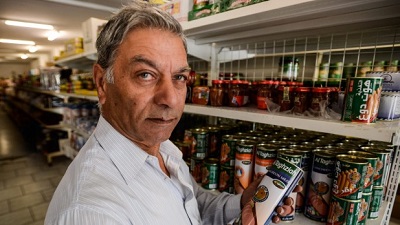





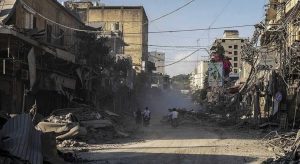


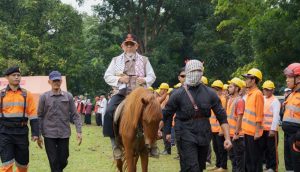
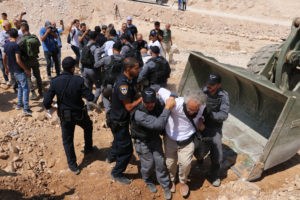
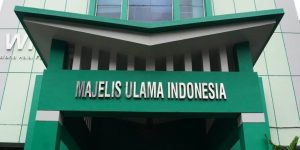
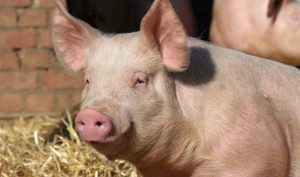
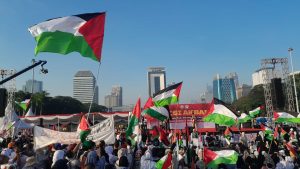
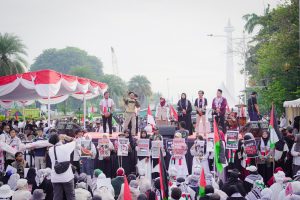
![MUI Chairman for Foreign Relations and International Cooperation, Sudarnoto Abdul Hakim (center) at the One Million Women for Gaza Press Conference entitled "Women Boycott Pro-Israel Products" held at the Swiss-Belinn Cawang Hotel, East Jakarta, Thursday (3/7/2025). [Photo: Arina/MINA]](https://en.minanews.net/wp-content/uploads/2025/07/20250703_144042-scaled-1-300x225.jpg)















 Mina Indonesia
Mina Indonesia Mina Arabic
Mina Arabic